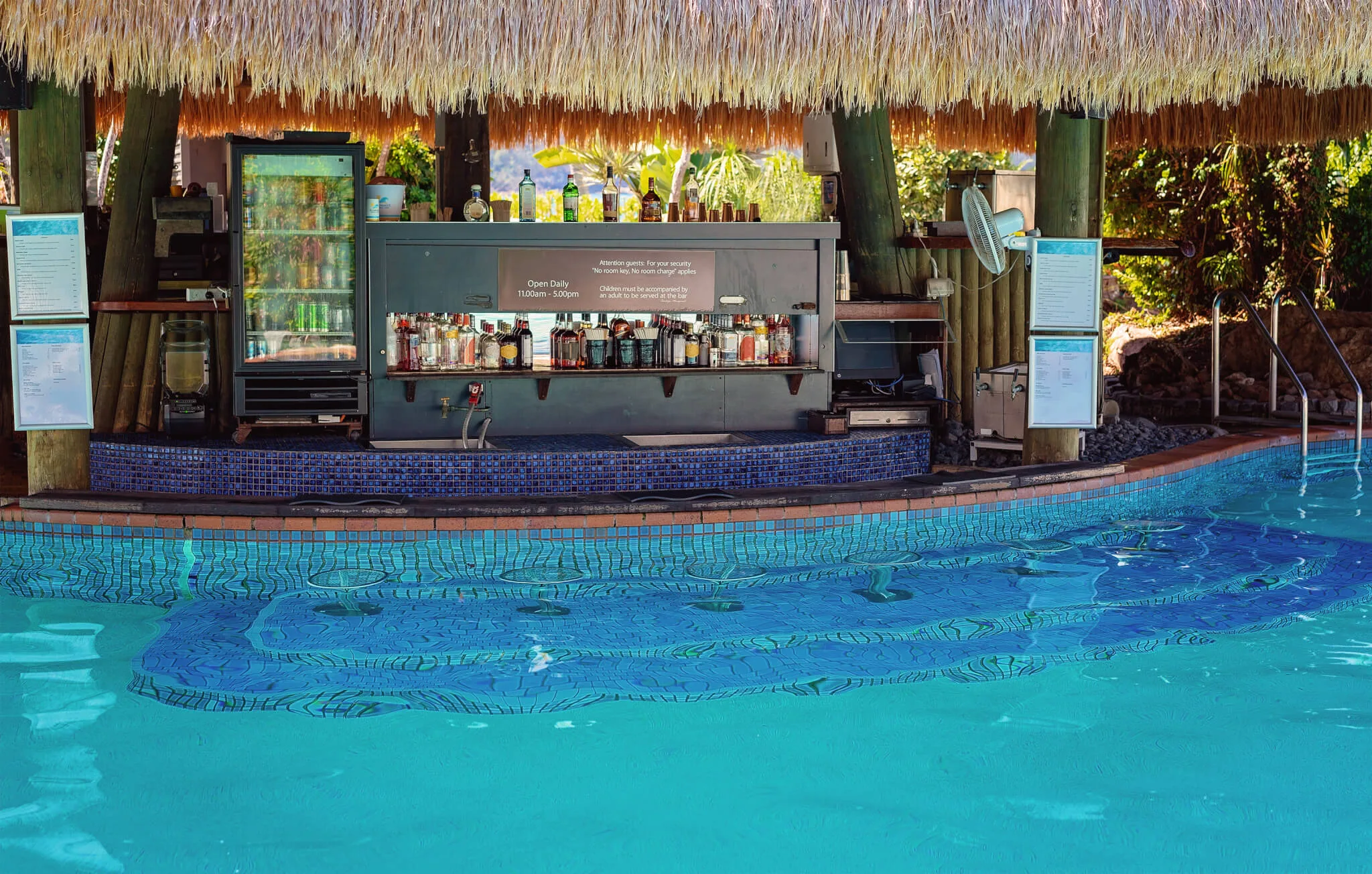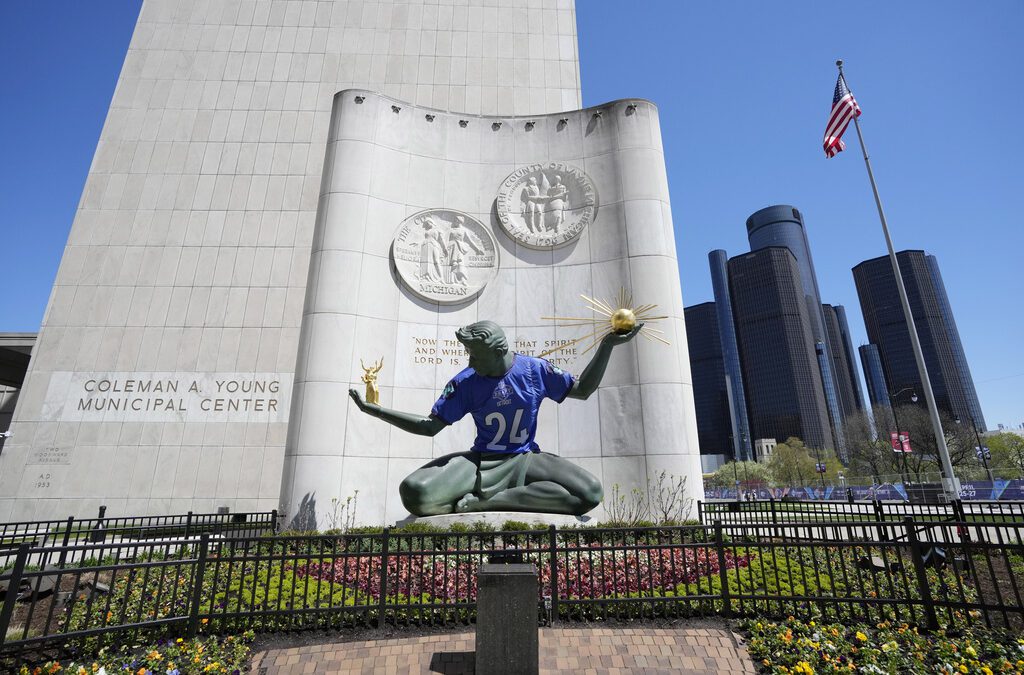
New state laws mean you can now swim up to get a drink, and soon you could pour your own beer.
Need to Know
- Swim-up bars are now legal in the state, and self-serve taps could come soon. Both have ample safety features built in.
- Under new state law, 17-year-olds can serve liquor, in an attempt to solve staffing shortages.
- While workers don’t expect big disruptions to the service industry, the changes could bring exciting new restaurants and inject life back into Michigan restaurants that have faced staffing shortages.
UPDATE (July 14): Gov. Whitmer signed the bill to legalize self-serve taps in Michigan.
LANSING—How Michiganders consume their favorite mixed drinks, wines, and beers is getting seriously shaken up.
Newly passed and pending laws are changing how Michiganders can drink, who can serve it to them, and, potentially, how much it will cost.
The news has generated a buzz around Lansing, and some Michigan businesses owners are vying to be the first in line to boast a swim-up bar or a self-serve beer wall.
“The industry is ever-changing and we need new ways of creating experiences for people,” said Scott Ellis, executive director of the Michigan Licensed Beverage Association (MLBA).
Royal Oak engineer Jon Stoia has been waiting for one legislative ball to drop before he can open a long-planned self-pour taproom. He and his wife discovered self-serve taps when they were living out of state, and since moving back to Michigan, they’ve been helping usher along legislation that could soon be signed to make the same kind of business legal here.
The Science Behind Beer Walls
How wall taps work is simple: They’re just like a regular tap behind a bar, only in addition to pulling the lever, you also have to swipe a prepaid card that’s given to you at the front of the restaurant. Swiping the card unlocks a chamber to let the drink of choice flow.
“At first when you hear self-pour, I think there’s a concern that someone’s going to pop a keg in the middle of the room,” Stoia said. “In reality, the way the law’s written and the way you can utilize technology, you still have lockouts and controls.”
Self-serve taps are ideal for beer aficionados who want to try the room before settling on a beer they like, because they can pay by the ounce. For those itching to try a watermelon sour, for example, they can pour themselves a couple of ounces before moving onto a full glass of a more traditional IPA.
Now, these so-called beer walls will likely be coming to Michigan, as they already exist in all the neighboring states, Ellis said. Stoia hopes to be among the first, if not the first, in Michigan.
Stoia said he’s gearing up to open North End Taproom in Royal Oak around the end of the year, and there’s already palpable intrigue about the concept. At 111 South Main St., it will feature mainly Michigan beers, with unique, outside-the-box brews that are made for sampling.
“People are just interested,” Stoia said. “It sounds new to them, and you have a lot of people excited to come try it out.”
Previously, Michigan law permitted taps at tables, but the self-serve mechanism as a primary means for distributing drinks to individuals is new. It includes beers, wines, and pre-made cocktails.
MLBA’s Ellis, who co-owns MichiGrain Distillery in Lansing, is considering the model to augment his business as well, by serving craft cocktails on tap. Installing a self-serve tap, while expensive, could insulate his business from staffing fluctuating, he said.
“I have to think about how it will work logistically and physically in the building,” he said. “But I think it will attract—maybe it’s a marketing type thing… first beer wall in town”
Ellis said that in advocating for bills on behalf of the MLBA, he found that legislators’ biggest concern was safety. Running about $1000 apiece for the technology, self-serve taps have several safety features built in, he noted:
- Each pour cannot distribute more than 16 ounces of beer or 12 ounces of wine or cocktails.
- At least one employee constantly monitors customers’ sobriety levels.
- Customers are required to show their ID in order to purchase a prepaid key card.
- Key cards have a maximum upload amount, and customers must check in with an employee to re-up their funds.
- If a customer seems highly intoxicated, employees can cancel their key cards through a central computer system, effectively “cutting them off.” The amount will be refunded directly back to the customer’s credit card.
The bill to legalize self-serve taps is expected to be signed into law by Gov. Gretchen Whitmer shortly after the holiday weekend, following its long road through the Michigan legislature, which concluded when the Senate took up the final package in a 36-1 vote last Thursday.
If signed, self-serve taps will be the newest addition to a rapidly changing Michigan liquor landscape.
Other Ways to Get Your Drinks
On June 14, 2022, Gov. Gretchen Whitmer signed a law to let Michigan businesses operate swim-up bars. Businesses must pay an annual fee of $350 to operate a swim-up bar located within a pool, as long as the bar is regularly disinfected, physically separated from crowded areas and minors, and meets other safety conditions.
The drinks, which can contain any type of alcohol, must also be served in plastic cups.
Michigan has just over 5,000 publicly licensed swimming pools, so people could soon swim away with a drink at some of the more popular resorts, bars, and restaurants in the state.
“The Bavarian Inn Zehnder Family applauds Governor Whitmer and the Legislators for approving the swim up bar legislation,” said Michael Keller Zehnder of Bavarian Inn Lodge, which operates Zehnder’s Splash Village indoor water park in Frankenmuth, in a press release. “This will enable hospitality business operators the opportunity to provide a new experience for their guests which will boost the Michigan Tourism Industry.”
Also on June 14, Whitmer signed a bill to allow 17-year-olds to sell and serve alcohol at restaurants, lowering the age requirement by a year. The bill is designed to expand the labor force and get more applicants through to restaurants, which have been especially short-staffed during the pandemic.
New servers who work with alcohol have to undergo training by the Liquor Control Commission, and they must also be supervised by someone 18 or older who has passed the program.
“We don’t think this is going to be this big thing where 17-year-olds are everywhere working,” Ellis said. “This is going to help supplement what [employers] are short on right now.”
Ellis said he has received about 10 calls or texts in a two-week timeframe from businesses around the state letting him know that they’ve had 17-year-old applicants for positions that they previously weren’t eligible for.
Staffing Bars and Beer Walls
Rahsaan Grissom, a board member for the Greater Detroit Chapter of the US Bartenders’ Guild, said people shouldn’t expect the one-year adjustment to lead to any drop-off in quality or responsibility. With the conditions of the bill in place, it could instead be a good opportunity to train people for more profitable jobs in the service industry from an earlier age, Grissom said.
“There are great people … who are forming programs for people to come into this industry and find it as a career,” Grissom said. “This can be a great step toward that, so you don’t have to wash dishes for five years.”
Grissom said he’s not worried about 17-year-olds coming in and taking jobs, given how short-staffed the service industry. And restaurant owners aren’t expecting the change of law to fix everything, but having more eligible workers could chip away at the problem, helping both employees and owners.
Similarly, Grissom said, while automation presents a challenge to every industry, he’s not too concerned about self-serve beer halls taking the place of bartenders, since the taps still require constant supervision.
The experience between beer halls and bars is so different that customers will continue to seek out bars for their atmosphere, and beer halls for a new experience, Grissom said. If anything, the new technology coming to Michigan could help mom and pop shops up north, where seasonal workers are hard to find.
“Part of both of these [bills] stems from the fact that we have been under a worker shortage for a long time,” Grissom said. “This is not something that is new. This is not something post-2020, post-pandemic or anything. It has affected all of us.”
While the service industry can be “exploitative,” it also becomes a reliable career for many people, Grissom said. But because of staffing shortages, more restaurant and bar workers are looking to head to more stable jobs, even if it means a pay cut.
These bills recognize that, Grissom said.
“The best thing that people can do to help us out is be nice to us,” Grissom said. “If people want to keep going out, be nice to your servers, be nice to your bartenders, be nice to your barbacks. And people will fall in love with this industry again, and we’ll get back on our feet.”
MICHIGAN LIFE: 10 Modern Wedding Traditions That Are Different Than You Remember
Politics

Investigator says Trump, allies were uncharged co-conspirators in plot to overturn Michigan election
DETROIT—A state investigator testified Wednesday that he considers former President Donald Trump and his White House chief of staff to be uncharged...

Michigan Dems introduce ‘Child Care for All’ legislation to lower costs for families
Lawmakers say Michigan is facing a ‘child care crisis.’ But a series of bills introduced this month would help to make child care (much) more...

Families of mass shooting victims and survivors call for education on new safe storage laws
BY KYLE DAVIDSON, MICHIGAN ADVANCE MICHIGAN—Parents of victims and survivors of the Oxford High School and Michigan State University shootings on...
Local News

US government agrees to $138.7M settlement over FBI’s botching of Larry Nassar assault allegations
DETROIT—The US Justice Department announced a $138.7 million settlement Tuesday with more than 100 people who accused the FBI of grossly mishandling...

NFL draft has been on tour for a decade and the next stop is Detroit, giving it a shot in spotlight
DETROIT—The NFL draft has taken the show on the road for a decade, giving cities around the country a chance to be in the spotlight. Detroit is on...





